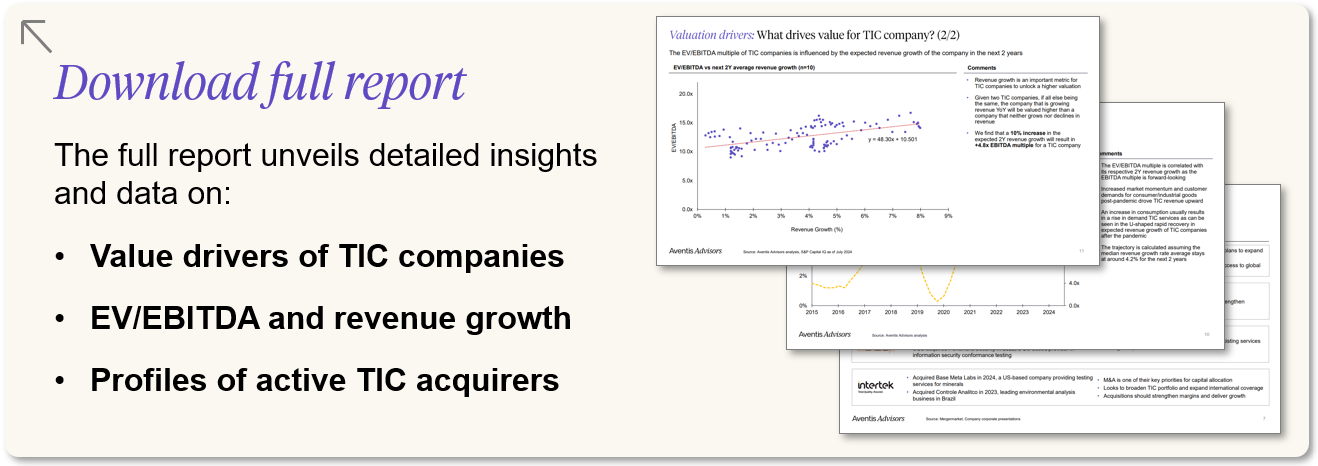Testing, inspection, and certification (TIC) is a fragmented sector, with many small testing laboratories and certification bodies operating independently. If you are a business owner in the TIC industry, chances are you are facing an increased number of acquisition inquiries from investors. It has become common for strategic buyers to acquire and consolidate the fragmented TIC market.
Additionally, as regulatory bodies become increasingly involved in various businesses and with a growing focus on quality and compliance, the TIC market has become a prime target for mergers and acquisitions. This is why understanding the M&A in TIC and TIC company valuations is more important than ever for buyers and sellers.
In this comprehensive article, we will try to understand everything about the TIC industry, from the basic definition of a TIC business to why there is a wave of M&A in TIC and what valuation you can expect when selling your TIC company.
So, let’s begin!
Table of contents
- What is a TIC business?
- Why is TIC attractive for M&A?
- Top acquirers in TIC
- Listed TIC company valuations
- Valuation drivers for TIC companies

What is a TIC business?
TIC is a service-oriented business that tests, inspects, and certifies its clients’ business activities to ensure that products, processes, systems, or services meet specified requirements and standards.
Put simply, TIC businesses are responsible for testing and inspecting your business, and if all your activities comply with legal and regulatory standards, they will provide you with a certificate to continue your operations.
The three major activities of TIC companies are:
- Testing: This involves both laboratory and field testing. For example, medical tests in a laboratory or food and agricultural produce tests to ensure the highest quality and compliance with safety standards
- Inspection: A few sectors are highly regulated, such as marine, aviation, industrial, energy, and more. Companies in these sectors are legally required to undergo periodic inspections and audits of their activities, which accredited TIC companies carry out.
- Certification & compliance: There are globally recognized certificates like ISO for management, HACCP certification for food safety, and many others. TIC companies are authorized to issue these certifications to their clients after ensuring all the requirements for the certificate are met.
The services of TIC companies are needed across all sectors. The biggest uses of TIC services are in oil and gas, building, construction, engineering, food and agriculture, life sciences, transportation, aerospace, marine, renewable energy, business management, automotive, and industrials. Like most industries, these sectors rely on TIC services to consolidate risk and compliance data streams and ensure compliance with regulations.
Why is the TIC sector attractive for M&A?
Testing, inspection, certification, and compliance (TICC) M&A deals have different rationales. The most common ones could be larger companies consolidating market share, access to niche technical know-how and TIC consultants, or growth by accessing new geographies. Entering new end markets through acquisitions is strategically important to enhance service capabilities, develop niche technology, and capitalize on the continued trend of market fragmentation.
By acquiring specialized TIC firms, larger companies can diversify their portfolios, leverage synergies, and achieve economies of scale, thereby driving growth and profitability through operating leverage.
Private equity investors are particularly interested in the TIC sector because it offers opportunities for ‘buy-and-build’ strategies, meaning acquiring several smaller companies and growing their combined business value. They do so by cross-selling more TIC services to the same customer base or optimizing costs.
If you own a TIC company and are planning an exit in a few months or years from now, you need to know who can acquire your business. In the following section, we have mapped the top acquirers in TIC.
Furthermore, the mission-critical nature of TIC services means they are indispensable for client businesses’ operational continuity and reputation management, ensuring sustained demand, a feature loved by PE investors in TIC space.
Top acquirers in the TIC industry
The TIC M&A landscape is dominated by listed strategic companies such as Bureau Veritas, Eurofins, Intertek, SGS, and others. Those have diversified services, international operations and a recognizable brand. Their clients are multinational corporations that require a wide variety of services across the globe, so M&A is one of the major ways they develop their service and geographical offering.
Private and private equity-backed platforms, such as Apave, TUV, Normec Group, and others, are also some of the most recognizable market players with a strong capital backing of private equity funds.
From our conversations with buyers and sellers in the TIC segment, we at Aventis see an ongoing consolidation wave in the TIC sector, with smaller niche players being absorbed by the larger ones. Due to the competition for the deals among many buyers, the valuations are currently particularly attractive to the sellers.
Some of the largest acquirers in the TIC industry between 2015 and March 2025 include:
1. Eurofins Scientific SE
Company overview: Eurofins Scientific SE provides worldwide analytical testing and laboratory services, specializing in ensuring product safety, composition, authenticity, and regulatory compliance across multiple industries. The company is headquartered in Luxembourg and has 62,000 employees as of 2025. Eurofins made 378 acquisitions between 2015 and 2025.
Recent acquisitions: Medical testing, water testing and inspection, pharmaceutical inspection, and microbiology testing companies
M&A strategy: Asia expansion through strategic acquisitions of genetic diagnostics companies
2. SGS SA
Company overview: SGS SA provides worldwide inspection, testing, and verification services across various industries. The company is headquartered in Switzerland and has 95,000 employees as of 2025. Between 2014 and March 2025, SGS completed 97 acquisitions.
Recent acquisitions: Pharmaceutical testing and inspection, security systems evaluation, clinical testing, and environmental testing laboratories
M&A strategy: Extend the range and geographic availability of existing services through acquisitions
3. Bureau Veritas
Company overview: Bureau Veritas is a world leader in laboratory testing, inspection, and certification services. Founded in 1828, the Group has more than 83,000 employees located in more than 1,600 offices and laboratories worldwide. Bureau Veritas has completed 61 acquisitions between 2014 and 2024.
Recent acquisitions: Electrical testing and inspection, building certification, management consulting and certification, and chemical testing companies
M&A strategy: Disciplined and selective bolt-on M&A strategy that will consider opportunistic deals on a case-by-case basis
Listed TIC company valuations
Now that you know TIC is a growing segment for M&A activity, a logical next question if you own a TIC business would be, “What is the value of my TIC company?”. This section deals with answering this very question.
TIC companies operate under a fairly simple business model. They have a streamlined approach (especially in management system certification or other TIC subsectors where there is minimal need for testing labs and instruments) to deliver quality services and ensure regulatory compliance across diverse industries.
TIC represents an attractive sector for strategic buyers and private equity investors due to its potential for M&A activity, market growth drivers, and opportunities for platform synergies and arbitrage. The stable, contract-based revenue streams from diverse industries provide predictable and reliable income, further enhancing the appeal for investors. This makes it easy to value the company based on its profits (multiples valuation) or forecast future cash flows (DCF method).
TIC company valuation: EV/EBITDA
We strated with a sample of 10 publicly traded testing, inspection, and certification (TIC) companies as a benchmark for valuation. However, we currently have 9 companies in the sample. Applus Services was a part of our analysis until it was delisted following a buyout by Amber EquityCo.
As of November 2025, the median valuation of a publicly traded TIC company was 14.3x EV/EBITDA.
However, in private TIC M&A deals, the valuations paid usually include a private company discount that considers the higher risk of private markets, the illiquidity premium, and the lack of comprehensively reported data only made available and analyzed during a transaction’s due diligence phase.
Starting in 2017, the valuation of Testing, Inspection, and Certification companies began to rise, peaking at 17.2x EBITDA. This was likely driven by increased market optimism, a pull-forward effect on sales, digital transformation, and growth prospects in the TIC sector.
The growing need for companies to comply with regulatory standards and obtain certifications for quality, safety, and environmental sustainability further drove demand for TIC services. This trend was particularly pronounced in the pharmaceuticals, food and beverages, automotive, and electronics industries.
However, the valuations sharply decreased to 12.6x in early 2020, reflecting the market’s reaction to the economic uncertainty brought by the COVID-19 pandemic and reduced client spending on TIC vendors, as evident by the slowing revenue growth during this period.
Over the last decade, the long-term average valuation of a TIC company was 14.2x EV/EBITDA. At the same time, we expect slightly lower valuations for smaller and less liquid private companies.
The companies in our sample are SGS, Bureau Veritas, Eurofins Scientific, Intertek, ALS, Montrose Environmental Group, Marlowe, Mistras Group, and UL Solutions.
Revenue growth
Before 2020, the TIC sector had benefited from secular tailwinds driven by digital transformation initiatives and heightened regulatory and quality standards. This effect accelerated demand for TIC services as companies sought to ensure compliance and enhance operational efficiency.
The revenue growth of TIC companies slowed down massively from 2020 to early 2021. This was due to customers of TIC vendors reducing their expenditure on testing, inspection, and certification due to business stoppages, supply-chain disruptions, or cost-cutting initiatives – all of these affected TIC valuations.
However, not all TIC companies experienced a slowdown. Those who served healthcare or pharmaceutical clients experienced higher business volumes and demand during this time.
TIC companies staged an impressive recovery starting from the second half of 2021 when lockdowns were slowly lifted, supply chain disruptions lessened, and clients went back to spending on TIC vendors.
TIC Valuation drivers: EBITDA margin or Revenue growth
Over the past decade, publicly traded Testing, Inspection, and Certification (TIC) companies have consistently demonstrated remarkably stable EBITDA margins that can be attributed to the competitive nature of the business, with some significant barriers to entry.
While EBITDA margin is a very important metric for TIC companies, it is not easy to sustain a margin that is abnormal relative to the industry. Most TIC companies have an EBITDA margin in the range of 12-20%. Thus, revenue growth becomes a key valuation driver for TIC businesses.
In our research, we found that given two TIC companies with identical operational metrics and market conditions, the one demonstrating higher year-over-year (YoY) revenue growth will achieve a higher valuation compared to a company with stagnant or declining revenues.
Investors and analysts view revenue growth as a sign of a company’s market demand, competitive strength, and ability to scale. It reflects the company’s current performance and potential, making it more attractive to investors.
Specifically, our analysis found that a 10% increase in the expected two-year revenue growth can result in an increase of approximately 1.5x to the EBITDA multiple. This multiplier effect underscores how revenue growth expectations can drive considerable value appreciation in the TIC sector.
About Aventis Advisors
At Aventis Advisors, we specialize in providing top-tier M&A advisory services across business services and TIC sector. We are experienced in TIC M&A advisory for international clients.
We believe the world would be better off with fewer (but better quality) M&A deals done at the right moment for the company and its owners. Our goal is to provide honest, insight-driven advice, clearly laying out all the options for our clients – including the one to keep the status quo.
Get in touch with us to discuss how much your business could be worth and how M&A advisor in TIC industry can help.




